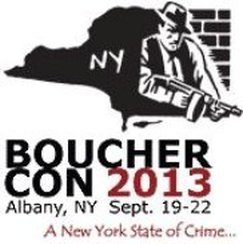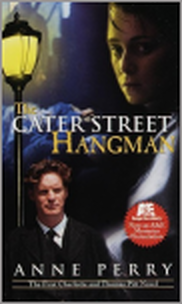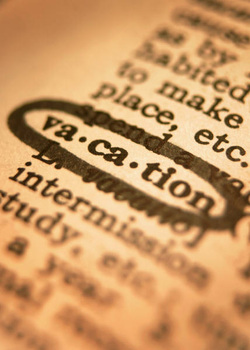|
I think a simple quote by the late great science fiction writer, Douglas Adams, will summarize what I've been thinking, as I work my way through my edits.... "I love deadlines. I like the whooshing sound they make as they fly by." --Douglas Adams Still trying to make my deadlines, so will be blogging again soon! Nearly done though!
0 Comments
 I know I really need to play it cool, but I just can't. The Bouchercon panels were recently announced, and I'm going to be on a panel with not one, but two, of my very favorite authors: Anne Perry and Caroline Todd (half of the Charles Todd writing team). I'm really looking forward to meeting the other authors on the panel too: Susanne Alleyn and Anna Loan-Wilsey, who have written some top-notch historical mysteries. And to top it all off, the session will be moderated by the lovely and talented Holly West, who was kind enough to interview me on her blog a while back.  the first Pitt novel the first Pitt novel I started reading Anne Perry's novels about twelve years ago, right when I first finished my Ph.D. in history. I hadn't been able to read for pleasure for many years--writing a dissertation will do that!--and I knew I missed reading mysteries in particular. Somehow, I stumbled on Anne Perry's Inspector Pitt series, and I was hooked. I think I read her first TWENTY books in about six months. I kid you not. I loved the characters, the mystery, and of course the history, and I couldn't get enough. When I ran out of Anne Perry novels, I turned to--you guessed it--Charles Todd. And then Rhys Bowen, Jacqueline Winspeare, and a whole slew of other authors who write great historical mysteries. These were the authors who inspired me to write my own historical mysteries. I don't know how many authors are lucky enough to meet their personal literary heroes. Back in May, I did get the opportunity to meet Caroline Todd at Malice Domestic, which was a thrill. But I can honestly say, I never expected to get this opportunity, and I have no doubt it will be a highlight of my writing career!  I was so ready to go on vacation, traveling to Philly and South Dakota, that of course I forgot to put up an official 'blog hiatus!' So thanks to those who checked back to see if I wrote anything new. So while I'm still in procrastination, er, vacation mindset, I got to thinking about that time-old question: Why do we Yanks 'take a vacation', while our chums across the pond 'go on holiday?' It turns out that, once again, we can blame our Puritan forefathers for the distinction. The original meaning Originally, the word "vacation" comes from old English, and until the early nineteenth century, it meant something different from our modern U.S understanding of the term. According to our trusty Oxford English Dictionary, the word "vacation" referred to the release or respite from some business, occupation or other activity. For example, in the prologue to the "Wife of Bath," Chaucer (c. 1386) wrote: "Whan he hadde leyser and vacacioun From oother worldly occupacioun." ("When he had leisure and vacation from other wordly occupation.") Vacation could also refer to leisure time for a specific purpose, such as when Thomas a Kempis (c.1450) instructed his readers to "Put the vacacion of god before all other things." Keep this definition in mind. Vacation also referred to those periods when law-courts, universities, or school were formally suspended or closed. In 1456, R. Pecock complained: "Hou myche labour is maad in ynnes of Court in Londoun, bi tymes of vacacioun, aboute the reding..of the Kingis Statutis." (How much labor is made in Inns of Court in London, [during] times of vacation, about the reading...of the King's Statutes.") I believe that this understanding is still common in the United Kingdom today, but feel free to let me know if I'm incorrect. These conceptions of the word "vacation" seem to have transported to the American colonies, and were in use until about the mid-nineteenth century. At this time, a shift in the understanding of the word "vacation" occurred. The shift in understanding According to Cindy Aron, professor of history emeriti at the University of Virginia, the modern U.S. notion of "vacation" first emerged among the elites in the early nineteenth century. While European aristocrats and the middling sorts had long taken excursions for pleasure, (at least back to the Middle Ages, if not the Roman times), such frivolity and hedonism was looked at a bit more askance here in the U.S. Long-held Puritan and Protestant beliefs about idleness and morality certainly kept the middle and working classes in check. In the early 19th century, however, physicians began to cajole their wealthy patients to take a "vacation," for their spiritual and physical health (re-framing those older definitions described above). They did not use the term 'holiday' which probably conjured images of merrymaking and hedonism, and was, in effect, a harder sell. Gradually, the idea of taking a vacation for one's health began to find a hold among the middle class as well. Certainly, the emergence of the railroads dramatically changed the way people thought about travel, particularly for leisure purposes. Previously inaccessible places (including such restorative places as lakes, oceans, hot springs etc) could now be readily reached by train, often for far less money than for a hired hack. Even more interestingly, Aron explains, is that Churches, particularly the Methodists, began to create religious campgrounds and resorts in the mid-nineteenth century. These were designed to appealed to those with holding an ethic that revolved around hard work, discipline and morality (e.g. the middle class). Such places offered a means to "get away from it all" while at the same time, allowing vacationers to feel they had not taken leave of their morals and virtues. "Organized idleness!" By the early twentieth century, members of the working class began to "take vacation" as well. Vacation was no longer a leisure pursuit of the privileged elite, but was rapidly becoming an expectation for most families. Motels, hotels, spas, and resorts became an industry in themselves, many emphasizing affordability and accessibility to attractions. Throughout the twentieth century, many establishments deliberately focused on supplying fun, hedonism and all the vices (Las Vegas, anyone?), and were far less concerned with offering an environment to rejuvenate the body and soul. So "taking a vacation" has certainly transformed over time. Personally, I find it really interesting that leisure had to be legitimated by Americans. Oh, how those Puritan impulses still linger! But whether you're on holiday, or taking a vacation, I hope you are enjoying your organized (unorganized?) idleness. I'll be blogging again soon. Right now, I'm on vacation from my vacation! Reference: Aron, C (1999).Working at Play: A History of Vacations in the United States.
|
Susanna CalkinsHistorian. Mystery writer. Researcher. Teacher. Occasional blogger. Categories
All
Archives
May 2023
|
 RSS Feed
RSS Feed